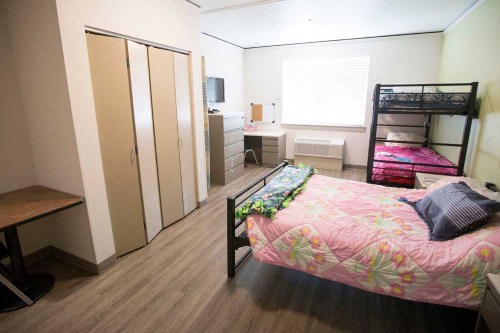Lawmakers unveil $200 million plan aimed at homelessness
Published 10:00 am Wednesday, March 1, 2023

- Oregon lawmakers in the 2023 legislative session have proposed spending more than $200 million to pay for Gov. Tina Kotek’s plans to help unhoused people and avert further homelessness.
SALEM — Lawmakers have proposed spending more than $200 million to pay for Gov. Tina Kotek’s plans to help unhoused people and avert further homelessness.
In addition to the $130 million Kotek specified in a Jan. 26 request, their plan adds $27 million for communities outside Oregon’s five urban areas that Kotek designated in an executive order Jan. 10, and more spending to increase some types of housing and aid homeless youths.
The spending will be in the form of House Bill 5019, which the Legislature’s joint budget committee will consider as the housing committees in both chambers continue to work on related legislation (House Bill 2001) to set housing policies. The Oregon constitution bars policy legislation from being attached to budgets.
Democratic legislative leaders say they want to have both bills ready for votes by both chambers by mid-March.
Rep. David Gomberg, a Democrat from the central coast, said the added $27 million responds to the concerns of rural and coastal communities. The League of Oregon Cities and the Oregon Mayors Association proposed per-capita state assistance at $40 per resident, with a minimum of $50,000 per city, but Kotek said that formula still would favor larger cities.
Gomberg is the House co-chair of the budget subcommittee that will take up the money measure.
“As a legislator representing parts of rural and coastal Oregon, it was important to me that our response to homelessness reach the entire state,” he said in a statement. “I’m proud to say we were able to secure funding that ensures our rural and coastal regions will be taken care of.”
More housing spendingBeyond the $27 million, the plan adds these other items to Kotek’s proposed spending, which is listed separately:
• $25 million for aid to homeless youths, such as shelters, rental assistance, outreach, and connections with mental health and addiction treatment services and programs for specific cultural needs.
• $20 million for production of modular homes, priority going to areas where wildfires or other disasters prompt the need for replacement housing. Marine Terminal 2 at the Port of Portland is being converted into a modular-housing production plant using mass timber, which will reduce the cost of and construction time for housing.
• $5 million for improvements in on-site housing for farmworkers. The housing must be in camps registered with the Department of Consumer and Business Services.
• $3 million for a revolving loan fund to help communities and developers jump-start construction for worker housing. The fund is aimed at helping developers get advance help for such pre-construction expenses as permit fees and systems development charges.
The plan also will contain provisions in House Bill 2001 to enable the state land use planning agency to help cities and counties — Metro in the three Portland area counties — set housing production goals and identify ways to make development easier. (The Land Conservation and Development Commission, the agency’s policy-making arm, also would be empowered to issue enforcement orders if local governments do not comply.)
The plan also proposes compromise language that would lengthen the notice for evictions from 72 hours (three days) to 10 days, and allow more time for tenants to obtain rental assistance or other help to avert evictions based on nonpayment of rent. The debate between tenant advocates and housing providers occurred Jan. 30 in a Senate committee considering Senate Bill 799.
Leaders reactThe leaders of the Legislature’s housing committees said in statements that the plan responds to immediate needs as lawmakers continue other work toward advancing Kotek’s stated goal of increasing annual state housing production to 36,000, up from an annual average of 20,000 during the past five years. Kotek said her goal covers a decade-old housing backlog –half of which is needed by people making less than the area median income – and future population growth in the next two decades.
“Each of my colleagues, no matter their party affiliation or elected office, understands our communities need to see change and that we must work together to make it happen,” said Rep. Maxine Dexter, a Democrat from Northwest-Portland, who leads the Housing and Homelessness Committee. “We have answered this moment of intense need with a swift and collaborative response.”
Sen. Kayse Jama, a Democrat from Southeast Portland, said the plan deals with the most pressing needs.
“Oregonians need relief now, and they need stability in the long term,” he said. “This bill accomplishes both.”
Governor’s requestThe specifics of Kotek’s Jan. 26 request, $40 million of which would come from the current two-year budget and $90 million from the next two-year budget that starts July 1, are below:
• Eviction prevention: $33.6 million to help 8,750 households stay put through rental assistance and other services.
• Shelter beds and housing navigators: $23.8 million to add 600 low-barrier shelter beds and staff for navigation centers to connect people with housing and other services. While she was Oregon House speaker in 2021, Kotek helped steer state money for navigation centers outside the Portland metro area, among them Salem, Eugene, Bend, Medford, Roseburg and McMinnville.
• Re-housing services: $54.4 million to help at least 1,200 households obtain new housing through prepaid rental assistance, block leasing of at least 600 vacant homes, guarantees and incentives for landlords, and other actions.
• Tribal assistance: $5 million for state help for the nine federal recognized tribes in Oregon.
• Culturally responsive organizations: $5 million to help such groups ensure equitable outcomes under Kotek’s declared state of emergency, so that no community is disproportionately affected.
• Sanitation: $2 million for local sanitation efforts.
• Coordination: $1.8 million for the Department of Emergency Management and the Department of Housing and Community Services to coordinate their efforts under one of Kotek’s executive orders, which call for state emergency management officials to oversee efforts in four of five designated regions (Marion and Polk counties; Eugene/Springfield; Medford/Ashland, and Central Oregon). In the Portland metro area, Kotek or her designee will oversee the effort.
Kotek activated the regional coordination on Friday, Feb. 23, when she convened the first meeting of the group consisting of the three Portland metro counties. Because of weather, the meeting was conducted via video link.









